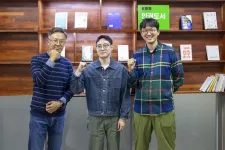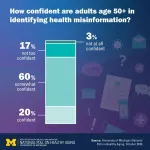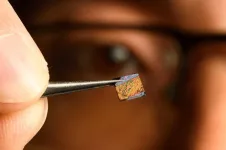(Press-News.org) EMBARGO: SYDNEY: 17 October 2024, 00.01 | NEW YORK: 16 October 2024, 09:00
Standing more may not reduce cardiovascular disease risk, could increase circulatory disease
Standing has gained popularity among people looking to offset the harms of a sedentary lifestyle often caused by spending long days sitting in front of the computer, television or driving wheel. Standing desks have become a popular option among office workers, and in other industries like retail, workers may opt to stand instead of sit.
However, their efforts may not produce the intended result. New University of Sydney research has shown that over the long-term, standing more compared with sitting does not improve cardiovascular health (coronary heart disease, stroke and heart failure), and could increase the risk of circulatory issues related to standing, such as varicose veins and deep vein thrombosis.
The study, published in the International Journal of Epidemiology also found that sitting for over 10 hours a day increased both cardiovascular disease and orthostatic incidence risk, reinforcing the need for greater physical activity throughout the day. The research also notes that standing more was not associated with heightened cardiovascular disease risk.
Lead author from the Faculty of Medicine and Health and Deputy Director of the Charles Perkins Centre’s Mackenzie Wearables Research Hub, Dr Matthew Ahmadi, said there were other ways for those with a sedentary lifestyle to improve their cardiovascular health.
“The key takeaway is that standing for too long will not offset an otherwise sedentary lifestyle and could be risky for some people in terms of circulatory health. We found that standing more does not improve cardiovascular health over the long term and increases the risk of circulatory issues,” Dr Ahmadi said.
While the researchers found that there were no health benefits gained from standing more, they cautioned against sitting for extended periods, recommending that people who are regularly sedentary or find themselves standing for long periods schedule regular movement throughout the day.
“For people who sit for long periods on a regular basis, including plenty of incidental movement throughout the day and structured exercise may be a better way to reduce the risk of cardiovascular disease,” said Professor Emmanuel Stamatakis, Director of the Mackenzie Wearables Research Hub.
“Take regular breaks, walk around, go for a walking meeting, use the stairs, take regular breaks when driving long distances, or use that lunch hour to get away from the desk and do some movement. In Australia, we are now coming into the warmer months, so the weather is perfect for sun-safe exercise that helps you get moving,” he said.
Professor Stamatakis and Dr Ahmadi’s research published earlier this year found that about 6 minutes of vigorous exercise or 30 minutes of moderate-to-vigorous exercise per day could help lower the risk of heart disease even in people who were highly sedentary for more than 11 hours a day.
The study was conducted using incident heart condition and circulatory disease data taken over a period of seven to eight years from 83,013 UK adults who were free of heart disease at baseline, measured using research-grade wrist-worn wearables similar to a smartwatch.
RESEARCH
Ahmadi, et al, Device-measured stationary behaviour and cardiovascular and orthostatic circulatory disease incidence: a population cohort study of 83,013 adults (International Journal of Epidemiology). DOI: https://doi.org/10.1093/ije/dyae136
INTERVIEWS
Dr Matthew Ahmadi | matthew.ahmadi@sydney.edu.au
Professor Emmanuel Stamatakis | emmanuel.stamatakis@sydney.edu.au
MEDIA ENQUIRIES
Luisa Low, Senior Media & PR Adviser | luisa.low@sydney.edu.au | +61 438 021 390
DECLARATION
The researchers declare no competing interests. Dr Matthew Ahmadi is funded by the National Heart Foundation and Professor Emmanuel Stamatakis is funded by the National Health and Medical Research Council. The study was conducted using data collected by the UK Biobank. The UK Biobank is a large-scale biomedical database and research resource containing de-identified genetic, lifestyle and health information and biological samples from half a million UK participants. It is the most comprehensive and widely-used dataset of its kind, and is globally accessible to approved researchers who are undertaking health-related research that is in the public interest, whether they are from academic, commercial, government or charitable settings. UK Biobank is helping to advance modern medicine and enable better understanding of the prevention, diagnosis, and treatment of a wide range of serious and life-threatening illnesses – including cancer, heart disease and stroke. Over 30,000 researchers from more than 90 countries are registered to use UK Biobank and more than 12,000 peer-reviewed papers have been published as a result.
END
Standing more may not reduce cardiovascular disease risk, could increase circulatory disease
The study also found sitting for over 10 hours a day increased both cardiovascular disease and orthostatic incidence risk
2024-10-16
ELSE PRESS RELEASES FROM THIS DATE:
Video series aims at improving indoor air quality
2024-10-16
Improving indoor air quality is the goal of a new video series developed by experts at the University of California, Davis in collaboration with the California Department of Public Health. Aimed at building and facility managers, the videos distill the science of air quality into steps building and facility managers can take to remove pollutants, including viruses, from the place we spend most of our time -- indoors.
“The goal is to help people understand the issues around indoor air quality, how it is related to disease, and what managers can do to make it better,” said Professor Chris Cappa, chair of the Department of Civil and Environmental ...
Men and women process pain differently, study finds
2024-10-16
In a new study evaluating meditation for chronic lower back pain, researchers at University of California San Diego School of Medicine have discovered that men and women utilize different biological systems to relieve pain. While men relieve pain by releasing endogenous opioids, the body’s natural painkillers, women rely instead on other, non-opioid based pathways.
Synthetic opioid drugs, such as morphine and fentanyl, are the most powerful class of painkilling drugs available. Women are known to respond poorly to opioid therapies, which use synthetic opioid molecules to bind to the same receptors as naturally-occurring endogenous ...
Korean research team proposes optimal utilization strategy for hydrogen energy, the key to carbon neutrality
2024-10-16
A joint research team, led by Dr. Sang Yong Park from the National Climate Technology Center at the Korea Institute of Energy Research (KIER) and Professor Dong Gu Choi from the Department of Industrial and Management Engineering at POSTECH, has developed an energy system model optimized for Korea's environment and proposed an optimal strategy for utilizing hydrogen energy.
Hydrogen is being highlighted as a key resource for achieving the government's "2050 Carbon Neutrality Scenario." It is not only a clean energy source in itself but can also be produced using surplus power from renewable ...
NFL Player Ambassadors urge fans to learn lifesaving CPR in 90 seconds
2024-10-16
DALLAS, October 16, 2024 — More than half of all people who experiencing sudden cardiac arrest outside of hospital don’t receive immediate cardiopulmonary resuscitation (CPR). As a result, 9 out of 10 times they die[1]. Yet it takes just 90 seconds to learn the fundamentals of Hands-Only CPR to save a life. CPR, especially if performed immediately, can double or triple a person’s chance of survival. To save more lives, the American Heart Association and the National Football League (NFL) are actively putting boots on the ground - cleats on the field - to educate ...
Most older adults don’t trust AI-generated health information — but many aren’t sure what to trust
2024-10-16
While the vast majority of people over 50 look for health information on the internet, a new poll shows 74% would have very little or no trust in such information if it were generated by artificial intelligence.
Meanwhile, 20% of older adults have little or no confidence that they could spot misinformation about a health topic if they came across it.
That percentage was even higher among older adults who say their mental health, physical health or memory is fair or poor, and among those who report having a disability that limits their activities. In other words, those who might ...
Invention quickly detects earliest sign of heart attack
2024-10-16
With heart attacks, every second counts. A new blood test diagnoses them in minutes rather than hours and could be adapted as a tool for first responders and people at home.
“Heart attacks require immediate medical intervention in order to improve patient outcomes, but while early diagnosis is critical, it can also be very challenging—and near impossible outside of a clinical setting,” said lead author Peng Zheng, an assistant research scientist at Johns Hopkins University. “We were able to invent a new technology that can quickly and accurately establish if someone is having a heart attack.”
The proof-of-concept work, which can be modified to detect infectious ...
New research confirms that young adults can also have large vessel occlusion strokes thought to happen in older adults, given the rise of stroke risk factors in younger adults
2024-10-16
New research published in the Journal of Stroke and Cerebrovascular Diseases confirms that strokes thought to happen in older adults are possible in the younger (defined as 18-50 years old) population. Large Vessel Occlusion Acute ischemic Strokes (LVO-AIS) are considered to be the most debilitating strokes which occur due to blockage of large cerebral arteries usually from blood clots or plaque build up. LVO-AIS is typically thought to occur in older adults given that older individuals are known to have risk factors for large vessel occlusions. However, new research confirms that the younger population can have risk factors ...
Grasslands live in the climate change fast lane
2024-10-16
Although all ecosystems are affected by a changing climate, the impacts can take a while to appear. Changes in forest biodiversity, for example, are known to lag behind changes in a habitat's temperature and precipitation.
Grasslands, on the other hand, are responding to climate change almost in real time, according to new research by the University of Michigan. Put another way, forests accumulate climate debt while grasslands are paying as they go, said the study's lead authors, Kai Zhu and Yiluan Song.
"Climate change does have consequences for our ecosystems. It's going to come sooner or later," said Song, a postdoctoral fellow at the ...
Mount Sinai Doctors to present at ID Week 2024
2024-10-16
Experts in infection prevention and control at the Mount Sinai Health will present new research and insights at ID Week, the joint annual meeting of the Infectious Diseases Society of America, the Society for Healthcare Epidemiology of America, the HIV Medicine Association, the Pediatric Infectious Diseases Society, and the Society of Infectious Diseases Pharmacists in Los Angeles from October 16-19.
Mount Sinai doctors and researchers are also available for comment on breaking health news including the flu, COVID variants, HIV/AIDS, mpox, West Nile virus, measles, and fall vaccinations.
PRESENTATIONS and POSTER SESSIONS
*All abstracts and presentations ...
Rewriting the future: New molecules reversibly change with light and heat
2024-10-16
In this age of cloud storage, few people are backing up data on CD-RWs. The technology to rewrite data on compact discs was made possible by phase-change materials altered by the light and heat of lasers, though this had a limit of 1,000 rewrites. Today, scientists investigating photoswitching molecules, which change their properties when irradiated, have been finding possible applications for these materials, ranging from photopharmacology to data storage.
Osaka Metropolitan University Graduate School of Engineering student Shota Hamatani, Dr. Daichi Kitagawa, a lecturer, and Professor Seiya Kobatake synthesized aza-diarylethenes, which have nitrogen in place of carbon in a molecular structure ...
LAST 30 PRESS RELEASES:
Prevalence of over-the-counter and prescription medication use in the US
US child mental health care need, unmet needs, and difficulty accessing services
Incidental rotator cuff abnormalities on magnetic resonance imaging
Sensing local fibers in pancreatic tumors, cancer cells ‘choose’ to either grow or tolerate treatment
Barriers to mental health care leave many children behind, new data cautions
Cancer and inflammation: immunologic interplay, translational advances, and clinical strategies
Bioactive polyphenolic compounds and in vitro anti-degenerative property-based pharmacological propensities of some promising germplasms of Amaranthus hypochondriacus L.
AI-powered companionship: PolyU interfaculty scholar harnesses music and empathetic speech in robots to combat loneliness
Antarctica sits above Earth’s strongest “gravity hole.” Now we know how it got that way
Haircare products made with botanicals protects strands, adds shine
Enhanced pulmonary nodule detection and classification using artificial intelligence on LIDC-IDRI data
Using NBA, study finds that pay differences among top performers can erode cooperation
Korea University, Stanford University, and IESGA launch Water Sustainability Index to combat ESG greenwashing
Molecular glue discovery: large scale instead of lucky strike
Insulin resistance predictor highlights cancer connection
Explaining next-generation solar cells
Slippery ions create a smoother path to blue energy
Magnetic resonance imaging opens the door to better treatments for underdiagnosed atypical Parkinsonisms
National poll finds gaps in community preparedness for teen cardiac emergencies
One strategy to block both drug-resistant bacteria and influenza: new broad-spectrum infection prevention approach validated
Survey: 3 in 4 skip physical therapy homework, stunting progress
College students who spend hours on social media are more likely to be lonely – national US study
Evidence behind intermittent fasting for weight loss fails to match hype
How AI tools like DeepSeek are transforming emotional and mental health care of Chinese youth
Study finds link between sugary drinks and anxiety in young people
Scientists show how to predict world’s deadly scorpion hotspots
ASU researchers to lead AAAS panel on water insecurity in the United States
ASU professor Anne Stone to present at AAAS Conference in Phoenix on ancient origins of modern disease
Proposals for exploring viruses and skin as the next experimental quantum frontiers share US$30,000 science award
ASU researchers showcase scalable tech solutions for older adults living alone with cognitive decline at AAAS 2026
[Press-News.org] Standing more may not reduce cardiovascular disease risk, could increase circulatory diseaseThe study also found sitting for over 10 hours a day increased both cardiovascular disease and orthostatic incidence risk




